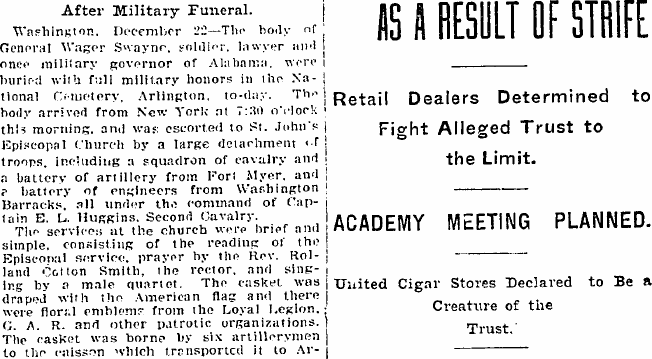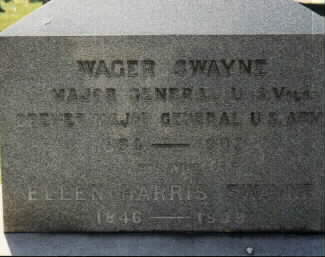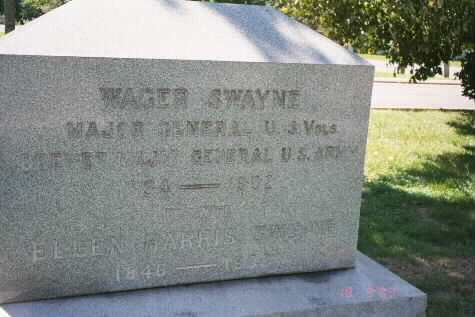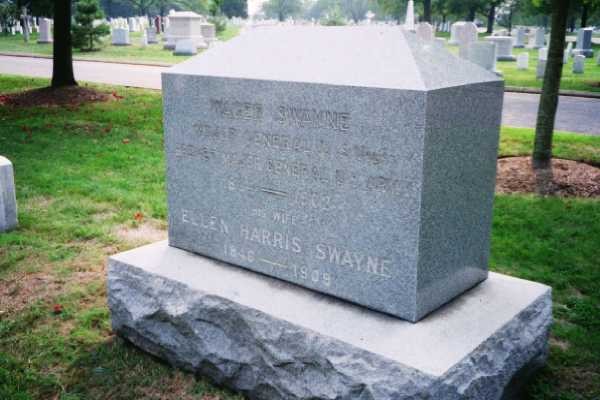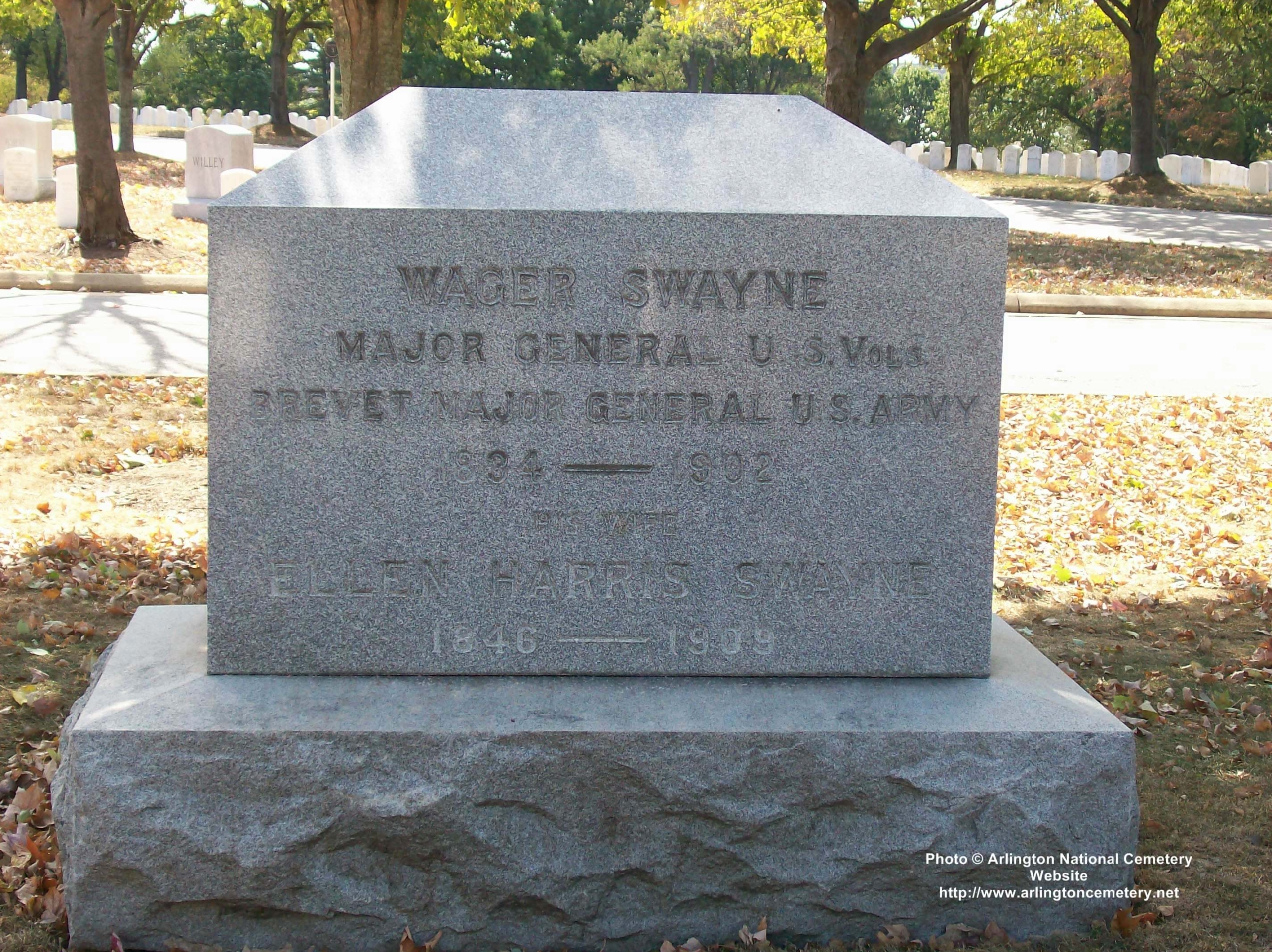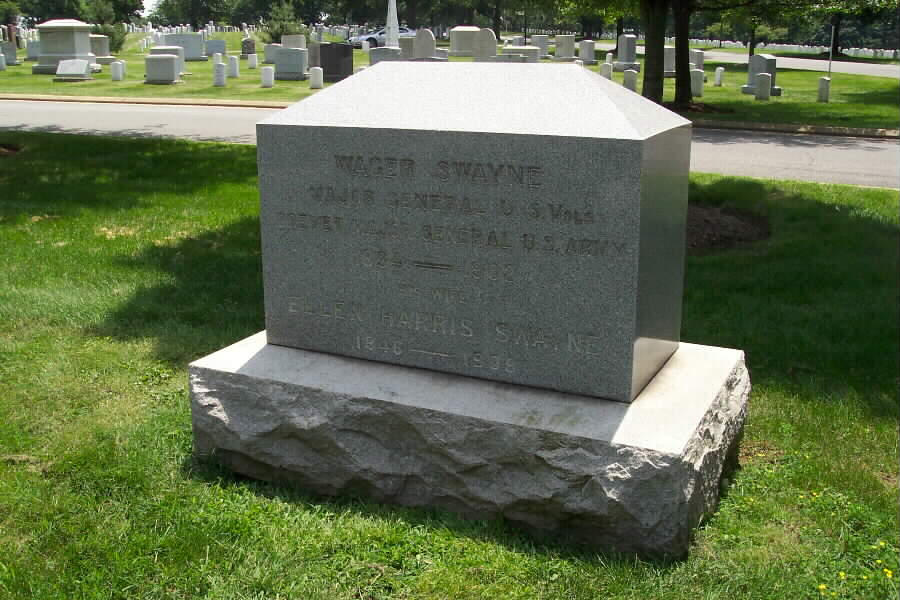Born at Columbus, Ohio, November 10, 1834, the son of United States Supreme Court Associate Justice Noah Haynes Swayne. Both of his parents were natives of Virginia who moved to free territory due to their opposition to slavery. He graduated from Yale in 1856, and from Cincinnati Law School in 1859.
He began the practice of law in Columbus with his father, who was elevated to the Supreme Court in 1862. On August 31, 1861 he entered the Union Army as Major of the 43rd Ohio Volunteer Infantry, a regiment which took part in operations against New Madrid and Island Number Ten under General John Pope. It also took part in the advance on Corinth after the Battle of Shiloh and at the Battle of Corinth proper in October 1862. He was awarded the Medal of Honor for gallantry displayed in this battle. That same month he was promoted to Colonel. From that time until the opening of the Atlanta Campaign in May 1864, he an his regiment performed garrison duty at various points in Tennessee. When General William T. Sherman pushed South toward Atlanta the 43rd Ohio, attached to XVI Corps, fought at Resca, Dallas, Keneshaw Mountain and in the other battles around and in Atlanta. When Sherman regrouped his forces for the “March to the Sea,” and the Campaign of the Carolinas, his regiment became part of XVII Corps.
On February 22, 1865, at the crossing of the Salkehatchie River in South Carolina, he was struck by a shell fragment which necessitated the amputation of his right leg above the knee. He was breveted Brigadier General of Volunteers as of February 5 and on March 13 he was given the full rank, although records do not indicate that he ever exercises Brigade level command at any time. By all accounts he was a gallant and accomplished officer whose contributions to the Union cause as a regimental commander was in the highest degree creditable.
However, it is questionable whether the rewards that he received after the war were due to his own accomplishments or to his father’s position and to the interest of his patron, General Oliver O. Howard. Later that year he was selected by Howard, Chief of the Freedman’s Bureau, to direct operations in Alabama, and since he would also be exercising military command, was elevated to Major General of Volunteers, May 1, 1866 to rank from June 20, 1865, the last such appointment made during the Civil War era. As a further mark of favor, he was commissioned Colonel in the newly authorized 45th U.S. Army Infantry and in 1867 was breveted Brigadier and Major General, U.S. Army.
When the Army was reorganized in 1869, his regiment was consolidated with the 14th U.S. Infantry and he was without a command until he was placed on the retired list the next year.
He then took up the private practice of law in Toledo, Ohio, but moved to New York in 1881, where he maintained a large and lucrative practice.
He died in New York on December 18, 1902 and was buried in Section 3 of Arlington National Cemetery. His wife, Ellen Harris Swayne (1846-1909), is buried with him.
SWAYNE, WAGER
Rank and organization: Lieutenant Colonel, 43d Ohio Infantry. Place and date: At Corinth, Mississippi, 4 October 1862. Entered service at: Columbus, Ohio. Born: 10 November 1834, Columbus, Ohio. Date of issue: 19 August 1893.
Citation:
Conspicuous gallantry in restoring order at a critical moment and leading his regiment in a charge.
Wager Swayne, lawyer, born in Columbus, Ohio, 10 November, 1834, was graduated at Yale in 1856, and at the Cincinnati law-school in 1859. On his admission to the bar he practiced in Columbus. He was appointed major of the 43d Ohio volunteers on 31 August, 1861, became Lieutenant Colonel on 14 December, 1861, Colonel on 18 October, 1862, served in all the marches and battles of the Atlanta campaign, lost a leg at Salkahatchie, South Carolina, and was breveted Brigadier General, United States volunteers, on 5 February, 1865, becoming full Brigadier General on 8 March, 1865, and major general on 20 June, 1865.
He was made Colonel of the 45th regular infantry on 28 July, 1866, and on 2 March, 1867, was breveted Brigadier General, United States army, for gallant and meritorious services in the action of Rivers Bridges, South Carolina, and major general for services during the war. He was mustered out of the volunteer service on 1 September, 1867 General Swayne was a commissioner of the freedmen’s bureau in Alabama, where he commanded the United States forces, and was also intrusted with the administration of the reconstruction acts of Congress, organizing an extensive system of common schools for colored children, who had none, and establishing at Montgomery, Selma, and Mobile important high-schools, which still remain, and also Talladega college. He retired on 1 July, 1870, and practiced law in Toledo, Ohio, but in 1880 he removed to New York city, where he is counsel for railroad and telegraph corporations.
Michael Robert Patterson was born in Arlington and is the son of a former officer of the US Army. So it was no wonder that sooner or later his interests drew him to American history and especially to American military history. Many of his articles can be found on renowned portals like the New York Times, Washingtonpost or Wikipedia.
Reviewed by: Michael Howard

